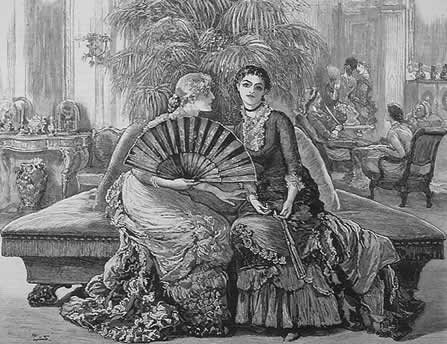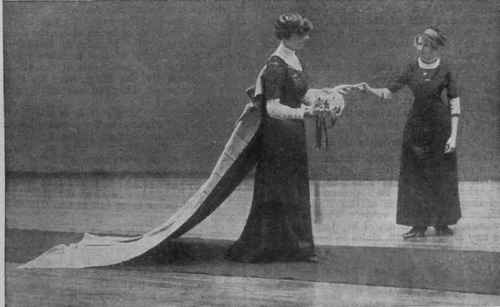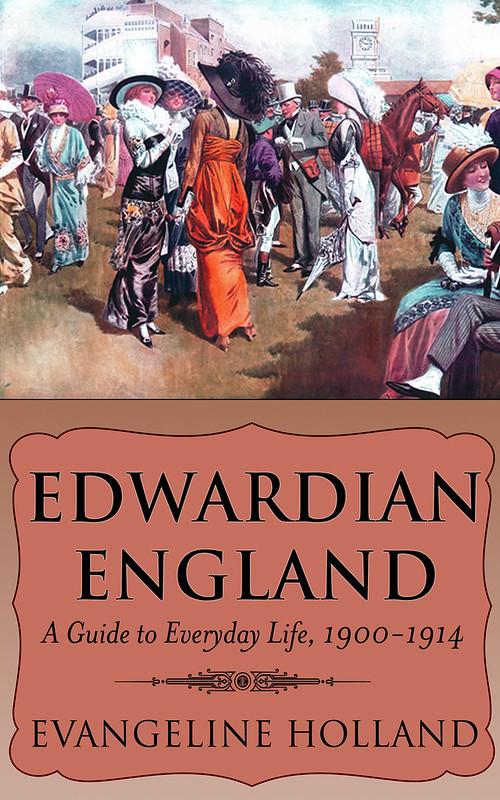 Edwardian house parties could be naughty, raucous, and elegant, but they were ruled by the strictest etiquette, ranging from how much to tip the servants, when to bathe, and when one was permitted to retire for bed! After a successful Saturday-to-Monday or week-long house party, courtesy demanded a note sent to the hostess expressing appreciation for the hospitality received, and this note–as I learned in Diana Cooper’s memoirs–was called a “bread-and-butter” letter or a “Collins” after the obsequious, long-winded, and pompous clergyman cousin of Mr. Bennet.
Edwardian house parties could be naughty, raucous, and elegant, but they were ruled by the strictest etiquette, ranging from how much to tip the servants, when to bathe, and when one was permitted to retire for bed! After a successful Saturday-to-Monday or week-long house party, courtesy demanded a note sent to the hostess expressing appreciation for the hospitality received, and this note–as I learned in Diana Cooper’s memoirs–was called a “bread-and-butter” letter or a “Collins” after the obsequious, long-winded, and pompous clergyman cousin of Mr. Bennet.
Why is this called a Bread-and-Butter letter? I turn to The Word Detective, who breaks down the possible origins of the phrase:
“Bread,” being the staff of life and all, is, of course, a very old word, though it’s interesting to note that in Old English the word simply meant “piece of food, morsel,” not necessarily the stuff cranked out by Pepperidge Farm. “Butter” is even older, and comes from the Greek “boutyron,” meaning literally “cow cheese.” By the way, that “staff of life” business comes from the Bible, where “to break the staff of bread” means to cut off the food supply that supports a people (as a walking staff supports an individual).
“Bread and butter” has been used, since at least the early 18th century, to mean “everyday kinds of food” (“It was strictly a bread and butter dinner, not a snail in sight”), but more often in a figurative sense to mean “means of living, basic financial support,” often of a distinctly unglamorous sort (“Sure, I dabble in tech stocks, but repossessing cars is my bread and butter”).
The logic of “bread and butter letter,” a term first appearing in print in the US in the early 20th century, seems to fall somewhere between those two uses. The writer is thanking his or her hosts for their hospitality (and food), but the letter is also a basic social formality, not likely to contain any exciting content. A “bread and butter” note may not be eagerly awaited, but it’s the sort of thing expected and probably noticed most in its absence.
This letter could never be too flattering or effusive, as the following examples attest:
Dear Candace,
Six o’clock last night found me home with the pleasantest memories of happy days passed with you in your lovely country place. It was so sweet of you to have that delicious basket luncheon prepared for me, which combined with magazines and papers so thoughtfully given me by Mr. Endicott helped to shorten an otherwise rather tiresome journey.
I am sending you a new book just out by the author we both enjoy so much and hope it pleases you as much as the others.
My love to you and yours.
Affectionately yours, Date Adelaide Colton
Dear Edith,
We arrived home still breathless from the exhilaration of those wonderful days spent with you. You were a dear to give us such a jolly time, and John and I are looking forward to the time when you can come and spend a while with us. Although we have no glorious lake for skating, we may, perhaps, be able to find a few other pastimes to interest you in our big city, although I know that anything short of Tinker’s Pond will prove a poor substitute.
Thank you, dear girl, for having us with you. John joins me in sending best regards to all the family.
Affectionately yours,
Mary K. Grainer.
My dear Miss Blank,
Tinker’s Corners is a landmark in my small geography of “special selections.” I am sure that the others whom you entertained so royally last week must feel as I do. The warmth of your hospitality will leave a glow in our memory for some time to come. With kindest greeting to your dear mother and brother, I am,
Cordially yours,
Helen D. Westvale.
In American idiom this type of letter was sometimes known as “the roofer,” no doubt in reference to the ego-elevating phrases!
This is now known (more mundanely, in my opinion) as the “Thank You Note”–and even that has grown quite rare. So now that you know what a Bread-and-Butter letter or Collins is, try you hand at writing a few to others. I’m sure many would be surprised and pleased to receive such a flattering note.
Sources
The Social Letter by Elizabeth Myers
Social Letters Made Easy by Gabrielle Rosiere
The Rainbow Comes and Goes by Lady Diana Cooper




Hi Evangeline,
I remember as a girl, my mother taught me that a proper guest never went without a “bread and butter” gift for the hostess. It could be something as simple as scented soaps, stationery, or baked goods. If I was staying overnight or a few days, I usually brought soaps or such, if it was just for dinner, I brought baked goods or flowers. Then, after I returned home, the first thing I did was write a “Thank You” note. My mom always made sure we had plenty of pretty little notecards to use just for this purpose as well as thanking for gifts.
I am amazed that this practice has all but disappeared. I never go to someone’s house for dinner empty-handed and I always drop them a note, even if by e-mail, telling them I had a wonderful time and the meal was delicious. Yet, people come to my home – nothing in hand, don’t offer to help and never send a thank you later – truthfully, it hurts my feelings. Some practices should come back not only because they are good manners but also because it makes others feel like their efforts were appreciated.
Thanks Evangeline for an informative post and I’m going to share it elsewhere. : )
Dear Evangeline,
As I sit staring out the window of this cloudy winter day, I can’t help but reflect on the entertainment and fun Downton Abbey brought to our lives last winter, and on how I wish to return sooner rather than later! Thank you for hosting our ‘visit’ then, and I hope you will not think me unforgivably forward in pressing a claim to another party in 2012.
Until then and affectionately yours,
Tasha B. 😉
Ah, the Edwardian house party! In Parade’s End, Sylvia Tietjens muses about her friends. “Passion not being their strong suit,” they were unlikely to engage in the sort of the enduring if discreet adulterous relationships that some of the truly titled enjoyed.
The affairs of her own set…were more tenuous. If they ever came to heads, their affairs, they had rather the nature of promiscuity and took place at the country houses where bells rang at five in the morning. Sylvia had heard of such country houses, but she didn’t know of any.
It being 1917, Sylvia’s gal pals were also finding London rather short of presentable men. And her husband, long-suffering Christopher, was heading back to France–partly to escape her.
How fascinating, I’ve never heard a thank you letter referred to as ‘bread and butter’ before. I love the whole Edwardian house party thing, it’s such a fabulous mixture of the quaint and the outrageous. Fascinating post.
I am old fashioned. I still write letters, especially thank you notes. I bring flowers, and gifts. It makes life easier and nicer. I love this site. I wish these kind of manners would still be
considered normal.